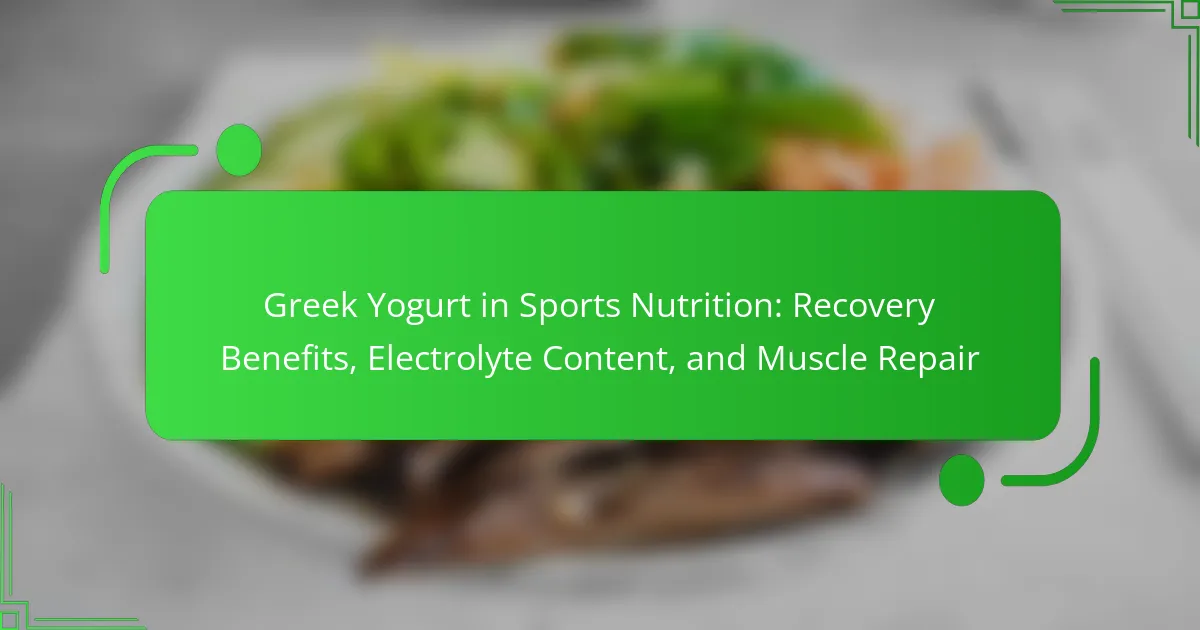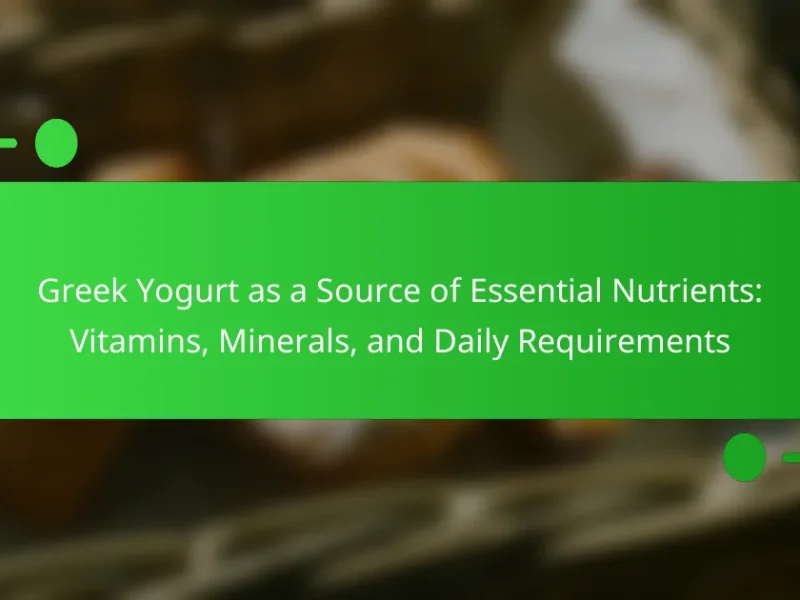Greek yogurt is a thick, creamy dairy product known for its high protein content, probiotics, and essential nutrients. It plays a significant role in sports nutrition by aiding muscle repair and recovery after exercise, thanks to its rich protein profile and presence of electrolytes like calcium and potassium. This dairy option not only helps enhance muscle synthesis but also supports hydration and muscle function during physical activity. With its lower sugar content compared to traditional yogurt and versatility in meal preparation, Greek yogurt is an optimal choice for athletes seeking effective recovery solutions.

What is Greek Yogurt and its Role in Sports Nutrition?
Greek yogurt is a thick, creamy dairy product made by straining regular yogurt to remove whey. It is rich in protein, probiotics, and essential nutrients. In sports nutrition, it serves as an excellent source of protein, aiding in muscle repair and recovery after exercise. The high protein content helps in muscle synthesis, which is critical for athletes. Additionally, Greek yogurt contains calcium and potassium, important for bone health and electrolyte balance. Studies show that consuming Greek yogurt post-workout can enhance recovery and reduce muscle soreness. Its versatility allows for easy incorporation into various meals and snacks, making it a convenient option for athletes.
How does Greek Yogurt contribute to athletic performance?
Greek yogurt enhances athletic performance by providing essential nutrients that support recovery and muscle repair. It is rich in protein, which aids in muscle synthesis after exercise. A typical serving contains around 15-20 grams of protein. This high protein content helps athletes recover faster from strenuous workouts. Greek yogurt also contains probiotics, which can improve gut health and enhance nutrient absorption. Improved nutrient absorption leads to better overall energy levels. Additionally, it has a good balance of carbohydrates, which replenishes glycogen stores post-exercise. The calcium in Greek yogurt supports bone health, crucial for athletes in high-impact sports. Overall, its nutrient profile makes Greek yogurt a valuable addition to an athlete’s diet.
What are the nutritional components of Greek Yogurt?
Greek yogurt contains high levels of protein, calcium, and probiotics. A typical serving of Greek yogurt has about 10 grams of protein. This protein content supports muscle repair and growth. Greek yogurt also provides approximately 15% of the daily recommended calcium intake. Calcium is essential for bone health and muscle function. Additionally, Greek yogurt contains probiotics, which promote gut health. These beneficial bacteria can aid in digestion and enhance nutrient absorption. Overall, Greek yogurt is a nutrient-dense food that supports athletic recovery and overall health.
How does the protein content in Greek Yogurt support recovery?
The protein content in Greek yogurt supports recovery by promoting muscle repair and growth. Protein is essential for rebuilding muscle fibers that are damaged during exercise. Greek yogurt typically contains around 10 grams of protein per 100 grams. This high protein content aids in synthesizing new muscle proteins, which is crucial after physical activity. Additionally, the amino acids in protein help reduce muscle soreness and inflammation. Studies show that protein intake post-exercise can enhance recovery rates. Therefore, consuming Greek yogurt after workouts can effectively support recovery processes in athletes.
What are the recovery benefits of Greek Yogurt for athletes?
Greek yogurt provides several recovery benefits for athletes. It is rich in protein, which aids in muscle repair after intense workouts. The high protein content helps to rebuild muscle fibers that are damaged during exercise. Greek yogurt also contains probiotics, which support gut health and enhance nutrient absorption. Additionally, it is a good source of calcium, essential for muscle function and recovery. The carbohydrates in Greek yogurt replenish glycogen stores depleted during exercise. Studies show that consuming protein and carbohydrates post-exercise improves recovery time. Furthermore, its low sugar content compared to other yogurts makes it a healthier option for recovery nutrition.
How does Greek Yogurt aid in muscle repair after exercise?
Greek yogurt aids in muscle repair after exercise primarily through its high protein content. It typically contains around 10 grams of protein per 100 grams. This protein is essential for muscle recovery and growth. The amino acids in protein help repair damaged muscle fibers. Greek yogurt also contains probiotics that support gut health, which can enhance nutrient absorption. Additionally, it provides carbohydrates that replenish glycogen stores depleted during exercise. Studies indicate that consuming protein after workouts can significantly improve recovery outcomes. For instance, a study published in the “Journal of Sports Science & Medicine” found that protein intake post-exercise enhances muscle protein synthesis.
What role does Greek Yogurt play in reducing muscle soreness?
Greek yogurt plays a significant role in reducing muscle soreness. It contains high-quality protein, which aids muscle repair after exercise. The protein in Greek yogurt helps rebuild damaged muscle fibers. Additionally, Greek yogurt is rich in probiotics, which can support gut health. A healthy gut can enhance nutrient absorption, further benefiting recovery. Research indicates that protein intake post-exercise reduces muscle soreness and improves recovery time. Consuming Greek yogurt after workouts can thus contribute to less discomfort and quicker recovery.

What is the electrolyte content of Greek Yogurt?
Greek yogurt contains essential electrolytes such as sodium, potassium, and calcium. A typical serving of Greek yogurt (about 170 grams) provides approximately 50 mg of sodium, 300 mg of potassium, and 150 mg of calcium. These electrolytes are vital for maintaining hydration and muscle function, especially during physical activity. The presence of these electrolytes makes Greek yogurt a beneficial food choice for athletes and those engaged in sports nutrition.
How do electrolytes in Greek Yogurt support hydration?
Electrolytes in Greek yogurt support hydration by replenishing essential minerals lost through sweat. These electrolytes include sodium, potassium, and magnesium. Sodium helps retain water in the body, preventing dehydration. Potassium aids in fluid balance and muscle function. Magnesium contributes to energy production and muscle relaxation. Consuming Greek yogurt post-exercise can effectively restore electrolyte levels. Studies show that maintaining proper electrolyte balance is crucial for optimal hydration and performance. This makes Greek yogurt a beneficial food choice for athletes and active individuals.
What specific electrolytes are found in Greek Yogurt?
Greek yogurt contains several specific electrolytes. The primary electrolytes found in Greek yogurt include potassium, calcium, and magnesium. Potassium is essential for muscle function and helps maintain fluid balance. Calcium plays a crucial role in bone health and muscle contraction. Magnesium supports muscle recovery and energy production. These electrolytes contribute to hydration and overall performance, making Greek yogurt a beneficial food in sports nutrition.
How does electrolyte balance affect athletic performance?
Electrolyte balance is crucial for optimal athletic performance. Electrolytes, such as sodium, potassium, and magnesium, help regulate muscle function and hydration. An imbalance can lead to muscle cramps, fatigue, and decreased endurance. Studies show that athletes with adequate electrolyte levels perform better and recover faster. For example, a study published in the Journal of Sports Science found that electrolyte supplementation improved performance in endurance athletes. Maintaining proper electrolyte levels enhances overall physical capabilities during exercise.
Why is electrolyte intake important for athletes?
Electrolyte intake is crucial for athletes to maintain hydration and muscle function. Electrolytes help regulate nerve function and muscle contractions. They also prevent cramping and fatigue during intense physical activity. A study published in the Journal of Athletic Training found that electrolyte balance is essential for optimal performance. Athletes lose electrolytes through sweat, particularly sodium, potassium, and magnesium. Replenishing these minerals helps sustain energy levels and endurance. Insufficient electrolyte intake can lead to dehydration and decreased athletic performance. Therefore, athletes should prioritize electrolyte-rich foods and beverages, like Greek yogurt, to support their training and recovery.
How can Greek Yogurt be integrated into a post-workout meal?
Greek yogurt can be integrated into a post-workout meal by serving it as a protein-rich base for smoothies or bowls. It provides essential amino acids needed for muscle repair after exercise. Additionally, Greek yogurt can be paired with fruits for carbohydrates, aiding in glycogen replenishment. Adding nuts or seeds enhances healthy fats and further boosts protein content. This combination supports recovery and overall nutrition. Studies show that consuming protein shortly after exercise can improve muscle recovery and growth.
What are the best practices for consuming Greek Yogurt for recovery?
Consume Greek yogurt within 30 minutes post-exercise for optimal recovery. This timing helps replenish glycogen stores and aids muscle repair. Pair Greek yogurt with fruits or nuts for added carbohydrates and healthy fats. The protein content, approximately 10 grams per 100 grams, supports muscle recovery. Choose low-fat or non-fat options to reduce calorie intake while maximizing protein benefits. Incorporating Greek yogurt into smoothies can enhance nutrient absorption. Regular consumption can improve overall recovery due to its probiotic content, which supports gut health.

What are the unique attributes of Greek Yogurt in muscle repair?
Greek yogurt has unique attributes that support muscle repair. It is high in protein, providing approximately 10 grams per 100 grams. This protein content aids in muscle recovery post-exercise. Greek yogurt contains casein protein, which digests slowly, supplying amino acids over an extended period. This slow release helps sustain muscle repair and growth.
Additionally, Greek yogurt is rich in probiotics. Probiotics can enhance gut health, improving nutrient absorption. Enhanced absorption allows for better utilization of nutrients essential for muscle recovery. Greek yogurt also contains calcium, which is vital for muscle contractions and overall muscle function.
Moreover, it has lower sugar content compared to traditional yogurt, making it a healthier choice for athletes. The presence of potassium in Greek yogurt helps maintain electrolyte balance after intense workouts. These unique attributes make Greek yogurt an excellent option for muscle repair in sports nutrition.
How does Greek Yogurt compare to other recovery foods?
Greek yogurt is a superior recovery food compared to many alternatives. It contains high levels of protein, typically around 10 grams per 100 grams, which aids muscle repair. This protein content is higher than most other dairy products and many plant-based recovery foods. Greek yogurt also provides probiotics, which support gut health and improve nutrient absorption.
In addition, it has a good balance of carbohydrates, essential for replenishing glycogen stores post-exercise. Many recovery foods lack this ideal macronutrient profile. Furthermore, Greek yogurt is rich in calcium and potassium, important for muscle function and recovery. Studies indicate that the combination of protein and carbohydrates in Greek yogurt can enhance recovery more effectively than solely carbohydrate-based options.
Overall, Greek yogurt stands out for its comprehensive nutrient profile, making it a top choice for post-exercise recovery.
What makes Greek Yogurt a preferred choice for athletes?
Greek yogurt is a preferred choice for athletes due to its high protein content and beneficial nutrients. It typically contains around 10 grams of protein per 100 grams. This protein aids in muscle repair and recovery after intense workouts. Greek yogurt also has probiotics, which support gut health and digestion. Healthy gut function can enhance nutrient absorption, crucial for athletic performance. Additionally, it is lower in sugar compared to regular yogurt, making it a healthier option. Greek yogurt provides essential vitamins and minerals, such as calcium and potassium, which are important for muscle function and hydration. The combination of these attributes makes Greek yogurt an excellent nutritional choice for athletes.
How does the fermentation process affect its benefits?
The fermentation process enhances the benefits of Greek yogurt by increasing its probiotic content. Probiotics are beneficial bacteria that support gut health and digestion. The fermentation process also breaks down lactose, making Greek yogurt easier to digest for those who are lactose intolerant. Additionally, fermentation increases the bioavailability of nutrients, allowing for better absorption of vitamins and minerals. Studies show that fermented dairy products can improve immune function and reduce inflammation. This makes Greek yogurt particularly beneficial for athletes in recovery. The presence of live cultures contributes to these health benefits, promoting overall well-being.
What tips can enhance the effectiveness of Greek Yogurt in sports nutrition?
Incorporating Greek yogurt into sports nutrition can be enhanced by combining it with fruits, nuts, or seeds. This combination increases the nutrient profile, providing additional vitamins and healthy fats. Consuming Greek yogurt post-workout aids in muscle recovery due to its high protein content, which is about 10 grams per 100 grams. Adding honey can provide quick-digesting carbohydrates, further supporting recovery. Using Greek yogurt as a base for smoothies can improve hydration and nutrient absorption. Choosing plain Greek yogurt avoids added sugars, ensuring a healthier option. Regular consumption can promote muscle repair and growth due to its rich amino acid profile.
How can athletes incorporate Greek Yogurt into their daily diet?
Athletes can incorporate Greek yogurt into their daily diet in several effective ways. They can use it as a breakfast base by adding fruits and nuts for enhanced nutrition. Greek yogurt serves as a post-workout snack, providing protein for muscle recovery. It can also be blended into smoothies for a creamy texture and additional protein. Athletes can substitute it for sour cream in recipes, maintaining flavor while boosting protein intake. Using Greek yogurt in salad dressings adds creaminess and nutritional value. Additionally, it can be eaten with granola for a balanced energy source. Each serving typically contains around 15-20 grams of protein, which supports muscle repair.
What are some recipes that maximize Greek Yogurt’s benefits for recovery?
Greek yogurt can be incorporated into various recipes to enhance recovery after exercise. One effective recipe is a Greek yogurt smoothie. Blend one cup of Greek yogurt with a banana, a tablespoon of honey, and a handful of spinach. This provides protein and carbohydrates for muscle repair.
Another recipe is a Greek yogurt parfait. Layer Greek yogurt with mixed berries and granola. This combination offers antioxidants and fiber, which support recovery.
A third option is a Greek yogurt dip. Mix Greek yogurt with garlic, lemon juice, and herbs. Serve with raw vegetables for a nutritious snack that aids in recovery.
Each recipe utilizes Greek yogurt’s high protein content, which is crucial for muscle repair. Additionally, these recipes include other ingredients that complement Greek yogurt’s benefits, such as fruits and vegetables rich in vitamins and minerals.
Greek yogurt is a nutrient-dense dairy product that plays a significant role in sports nutrition, particularly in muscle repair and recovery. It is rich in protein, probiotics, and essential electrolytes, which contribute to enhanced athletic performance and reduced muscle soreness. The article explores the specific nutritional components of Greek yogurt, its benefits for recovery, and how its unique attributes support muscle repair. Additionally, it discusses the importance of electrolyte balance for hydration and athletic performance, along with practical tips for incorporating Greek yogurt into a post-workout meal.


